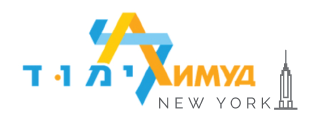LIMMUD FSU Recharge Presenters 2022
What is Limmud? What are the Principles? Also, learn some of our History and more.
Oleg Gang Professor of Chemical Engineering, Applied Physics and Materials science at Columbia University
Oleg Gang is a professor of Chemical Engineering, Applied Physics and Materials science at Columbia University, as well as a leader of the Soft and Bio-Nanomaterial Group at Brookhaven National Laboratory’s Center for Functional Nanomaterials. Oleg Gang grew up in Chernivtsi, Ukraine and immigrated to Israel in 1990. He studied physics at Bar-Ilan University and received MS in Atomic Spectroscopy and PhD in Soft Matter Physics. In 1999, as Rothschild Fellow he started his postdoctoral work at Harvard University, where he studied behavior of nanoscale liquids. In 2002 he joined Brookhaven National Laboratory as Distinguished Goldharber Fellow. Growing through science ranks he became a group leader and founding member of the Center for Functional Nanomaterial, a primer Department of Energy center focused on nanoscience and nanotechnology. In 2016, Oleg has joined faculty of Columbia University, School of Engineering and Applied Sciences. His group develops new strategies to create novel nano-materials by design using self-organization approaches, and to explore their properties for optical, energy, and biomedical applications. Gang is a Fellow of the American Physical Society and has received numerous accolades for his work, including the Gordon Battelle Prize for Scientific Discovery and Inventor of the Year Award.
Sessions
Nanotechnology: beyond the sci-fi
Nanotechnology has been widely popularized in the last decade due to its potential to change our technologies and life, for example, by converting energy, curing diseases, creating resilient materials and enhancing computing. This talk will discuss why nanotechnology holds such a high potential, what can we achieve today and what is on the horizon? Beyond the current view, the talk will present mind-binding ideas about nanoscale materials and machines that are being investigated in the labs: can these nano-systems build and manage themselves, and what exciting new functions they can enable?
